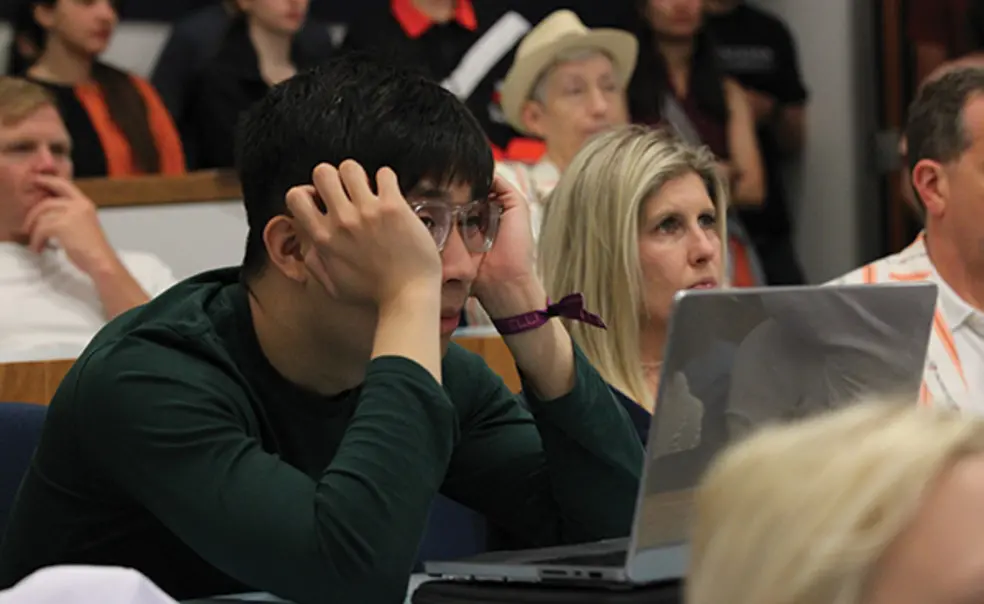In Climate Conversations at Reunions, Alumni Tackle Hot Topic
Solutions, skeptics, and sustainability efforts were a dominant presence throughout Reunions weekend
Climate and sustainability were front and center at Reunions, with several panels covering the topic and alumni pushing to make the massive event greener.
On Friday, at “Cool Thoughts on a Hot Topic,” speakers discussed the importance of using policy, research, innovation, and action to address the impact of rising temperatures.
One strategy suggested by Cleo Chou *16, adviser at the U.S. Agency for International Development, is to look to nature. Chou said that “forests and lands are critical to solving the climate crisis,” but cautioned that “really good governance and enabling environments” are required.
The following day, another group of alumni took up the discussion at an event in McCosh 50 — “Greening the Future: Challenges and Opportunities for Sustainable Solutions.”
“We really are at an intersection,” said Nicole A. Velasco ’08, of the energy service company NORESCO. She advocated looking to the past as well as forward, explaining that her native Hawaii is turning “our lens back to the people” by leveraging ancient Indigenous wisdom.
Robert L. Jaffe ’68, a professor at MIT, said the good news is that “renewable energy is abundant,” but unfortunately capturing and storing these types of energy are still outstanding technical problems.
One conversation went in a different direction. At Lewis Library, the Conservative Princeton Association sponsored a panel titled “Climate Change Is NOT an Emergency,” featuring speakers arguing that the news media and policymakers are pushing misinformation and fear.
Moderator Alex Zarechnak ’68, formerly of the engineering firm MPR Associates, said demands are rising that would overhaul infrastructure and society in a way that will harm the world’s poorest people. “There is a different perspective that you don’t hear very much about,” he said.
A few people in the standing-room-only audience questioned the panelists, all of whom work with the nonprofit CO2 Coalition. Princeton professor Forrest Meggers, who is part of the University’s efforts to go zero-carbon, challenged them, noting “it’s easy to pick and choose the science.”
At one point, the panel was Zoom-bombed, with the N-word and a doodle of male genitalia appearing on the screen. The technical staff immediately shut down the event on Zoom, and it continued in person.
University spokesperson Michael Hotchkiss said of the disturbance: “We regret that the online component of this alumni-organized event was disrupted and strongly condemn the language and imagery used by the perpetrator. The alumni organizers of the event did not use the University’s Zoom account; the University urges event sponsors to follow best practices, but no precautions are foolproof.”
Divest Princeton, a group of students, faculty, staff, and alumni who have been calling for the University’s divestment from fossil fuels since 2020, hosted an event to share updates on its goals. More than 70 attendees gathered in McCosh 28 at what Rob Nixon, professor of English and of the High Meadows Environmental Institute, called “a historic gathering at this historic moment in the Divest movement.”
The group is calling for the University to end its $700 million in private equity fossil fuel investments and all relationships with fossil fuel companies.
Claire Kaufman *23 urged neutrality in climate studies, as governments rely upon them when determining policies. “These companies are businesses, and expecting them to do anything but support their bottom line is fantasy,” she said.
At several events, alumni handed out flyers calling for signatures to an open letter (view it at bit.ly/GreeningReunions) urging the University to adopt a Reunions sustainability action plan. As of mid-June, the letter had 170 signatures from 63 classes. This year, members from 11 classes and the Association of Princeton Graduate Alumni contributed $31,000 to a fund that will offset approximately 23% of the estimated carbon footprint of Reunions travel, according to the Greening Reunions Alumni Working Group.
In addition, the Class of 1998 piloted a reusable cup program that had an 90% return rate. And according to advancement, about 70% of the 168,000 compostable cups used were collected for composting.













1 Response
Hamilton Osborne Jr. ’65
2 Years AgoThe Basis for Climate-Crisis Alarmism
The beliefs of climate-crisis alarmists are better explained by the classic book Extraordinary Popular Delusions and the Madness of Crowds than by modern “climate science,” much of which, in my opinion, is bogus.